On the fifth day of rehearsals for The Beatles’ Get Back/Let It Be project, the group continued work on the stronger songs performed thus far, and tested out arrangements on a number of others.
The early part of the day saw run-throughs of ‘Two Of Us’, ‘Don’t Let Me Down’, ‘I’ve Got A Feeling’, and ‘One After 909’. The Beatles were in reasonably high spirits at this point, playing through the songs with enthusiasm which was sadly lacking elsewhere for much of January 1969.
The momentum noticeably flagged when the group performed George Harrison’s ‘All Things Must Pass’, which the other Beatles had remained unenthusiastic towards. Equally aimless were versions of ‘She Came In Through The Bathroom Window’ and ‘Maxwell’s Silver Hammer’, songs which The Beatles would return to with greater focus later in 1969.
Another Abbey Road song making its debut on this day was ‘Mean Mr Mustard’. John Lennon had recorded a demo of the song in May 1968, but it was not considered for the White Album. On this day The Beatles performed a rough version which wasn’t much different from the final release, although in the lyrics Pam was known as Shirley.
Another Harrisong, ‘I Me Mine’, received more attention, with the group playing a total of 41 versions, although more often than not these were incomplete. This was the only day in January 1969 that The Beatles played it; although it was discussed in subsequent days, there was little inclination to return to it after this.
George Harrison had written ‘I Me Mine’ the night before, and it began as a plain acoustic song. The Let It Be film showed some footage of The Beatles working on the song on this day, but the album version was a re-recording made in January 1970.
Harrison: You know where they dropped all the bombs on Germany, they killed more people than…Starr: Thank the H bomb in Hiroshima. And all civilians.
Harrison: F*****g terrible. And did you see when they flew over it looked like Hamburg? Just bombed out. Nothing. Just dead.
Starr: Did you watch the BBC 2 thing?
Harrison: Yeah, there was that science fiction thing. It was amazing. Did you see any of it?
Michael Lindsay-Hogg: I only saw the last five, three minutes.
Harrison: It started very strange, where they brought – they had a fellow on a trolley, and they pushed him in, like, a cupboard or a fridge.
Starr: He was the body, wasn’t he?
Harrison: He was just, like, a body, yeah, that they were gonna use. And they did something. They were supposed to be in the year 2100 and something. And they went back to 1969, January. Focused in on the M1 on this car, and made him crash so that he’d… and then they somehow take his mind or whatever it is and transplant it into this new body.
Starr: Into the body that he put in.
Harrison: Rex Industries, they were called. And then suddenly it turned into all that crap about medals and things. That’s what gave me the idea, ’cause suddenly it was the bit where they were all coming into the ball, I think it was Austria, and they all had their medals.
Starr: Oh, I didn’t watch that.
Harrison: And some music was just playing. Music, like a 3/4 thing. And so I just had that in me head, just the waltz thing, and it was fitting ‘I Me Mine’. There was no words to it, I just…
“That science fiction thing” mentioned by Harrison was the play Immortality Inc., part of the Out Of The Unknown series, which was shown on BBC 2 at 9.05pm on 7 January 1969. The Radio Times billing said: “Starring Charles Tingwell, Dallia Penn. Can an ageing man transfer his mind into a young and active body?” It was followed at 9.55pm by Europa, “A look at pomp and circumstance through European eyes”.
Two songs by Paul McCartney, ‘Let It Be’ and ‘The Long And Winding Road’, had by this stage been established as proper contenders deserving sustained work. McCartney had by now completed writing both songs, so much of his efforts were devoted to helping the rest of the group learn the chord changes and arrangements.
Of the cover versions and improvisations, there was little from this day that was noteworthy, most of them being brief renditions in between proper rehearsals. Two early Lennon-McCartney compositions – ‘Too Bad About Sorrows’ and ‘Just Fun’ – were performed, but each lasted just seconds.
After ‘Two Bad About Sorrows’, however, Lennon made the remark: “Queen says no to pot-smoking FBI members”. This was included on the Let It Be album prior to ‘For You Blue’, and was the only piece of audio recorded at Twickenham to be used on the record; everything else was recorded either at Apple or Abbey Road.
The day ended with a lengthy conversation about potential locations for a live show. Michael Lindsay-Hogg continued to push for the outdoor theatre in Sabratha, Libya. The QE2 was also suggested, but George Harrison in particular reacted negatively to all suggestions of travelling to film.
Performances of ‘I Me Mine’, ‘Two Of Us’, ‘Don’t Let Me Down’, ‘Stand By Me’, ‘Baa, Baa, Black Sheep’, ‘Maxwell’s Silver Hammer’, ‘You Win Again’, ‘Let It Be’, and ‘Adagio For Strings’ from this day appeared in part one of the 2021 documentary Get Back.
The full list of songs recorded on this day, including fragments and off-the-cuff, unpublished songs with presumed titles (plus primary composer/best-known performer):
- ‘I Me Mine’ (41 versions)
- ‘I’ve Got A Feeling’ (two versions)
- ‘Honey Hush’ (Big Joe Turner)
- ‘Stand By Me’ (Ben E King)
- ‘Hare Krishna Mantra’ (Hindu chant; two versions)
- ‘Two Of Us’
- ‘You Got Me Going’ (McCartney)
- ‘Twist And Shout’
- ‘Don’t Let Me Down’ (two versions)
- ‘St Louis Blues’ (WC Handy)
- ‘One After 909’
- ‘Too Bad About Sorrows’ (Lennon-McCartney)
- ‘Just Fun’ (Lennon-McCartney)
- ‘She Said She Said’
- ‘She Came In Through The Bathroom Window’
- ‘One Way Out’ (Elmore James)
- ‘MacArthur Park’ (Richard Harris)
- ‘All Things Must Pass’ (11 versions)
- ‘Mean Mr Mustard’
- ‘Fools Like Me’ (Hank Williams)
- ‘You Win Again’ (Hank Williams)
- ‘Right String, Wrong Yo-Yo’ (Carl Perkins)
- ‘Boogie Woogie’ (Lennon)
- ‘Baa, Baa, Black Sheep’ (trad)
- ‘Mr Bassman’ (Johnny Cymbal)
- ‘Maxwell’s Silver Hammer’ (13 versions)
- ‘How Do You Think I Feel’ (Elvis Presley)
- ‘The Ballad Of Bonnie And Clyde’ (Georgie Fame)
- ‘Hello Mudduh, Hello Fadduh! (A Letter From Camp)’ (Allan Sherman)
- ‘I Me Mine’
- ‘FBI’ (The Shadows)
- ‘Oh! Darling’
- ‘Let It Be’ (three versions)
- ‘The Fool’ (Sanford Clark)
- ‘Domino’ (Doris Day/Andy Williams)
- ‘The Long And Winding Road’ (six versions)
- ‘Adagio For Strings’ (Samuel Barber)
- ‘True Love’ (Cole Porter)
- ‘Shout’ (The Isley Brothers)
- ‘Sweet Little Sixteen’ (Chuck Berry)
- ‘Malagueña’ (trad)
- ‘Almost Grown’ (Chuck Berry)
- ‘What Am I Living For’ (Chuck Willis)
- ‘Rock And Roll Music’
- ‘To Kingdom Come’ (The Band)
- ‘Get Your Rocks Off’ (Dylan)
- ‘Well, If You’re Ready’* (McCartney)
- ‘Life Is What You Make It’* (Lennon-McCartney-Harrison-Starkey)
- ‘I’m Going To Knock Him Down Dead’* (Lennon)
- ‘Tell All The Folks Back Home’* (McCartney)
* presumed title.
View the complete list of songs played during the January 1969 Get Back/Let It Be sessions.
Also on this day...
- 1990: Paul McCartney live: National Exhibition Centre, Birmingham
- 1970: Recording, mixing: Let It Be, For You Blue – George Harrison’s final recording session with The Beatles
- 1965: Live: Another Beatles Christmas Show
- 1964: Live: The Beatles’ Christmas Show
- 1963: Television: Roundup
Want more? Visit the Beatles history section.


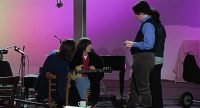
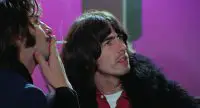
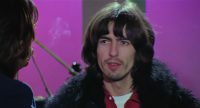
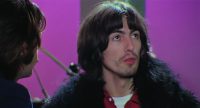
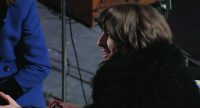
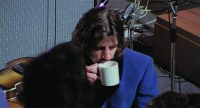
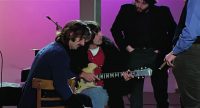
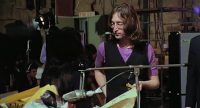
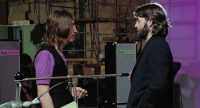
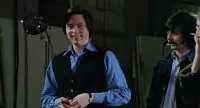
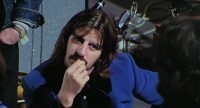
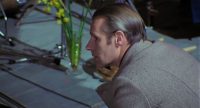
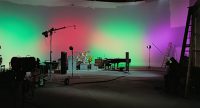
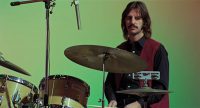
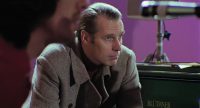
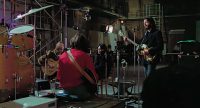

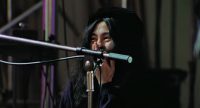
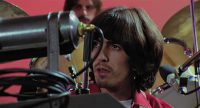
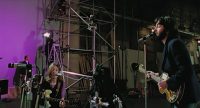
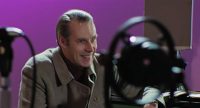
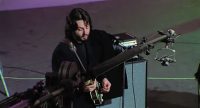

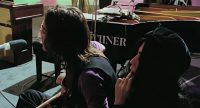
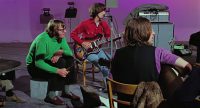
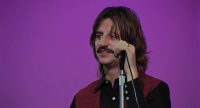
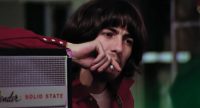
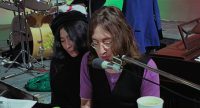
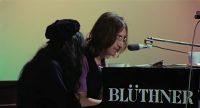
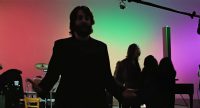
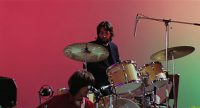
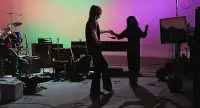
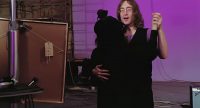

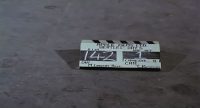

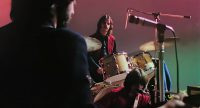


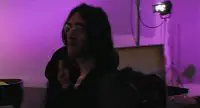
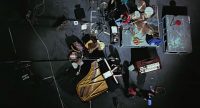

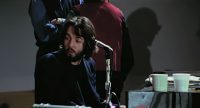
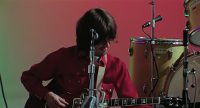
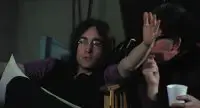
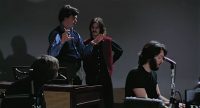
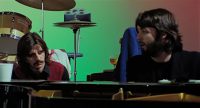
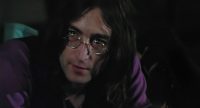
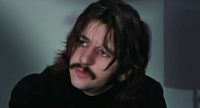
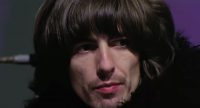
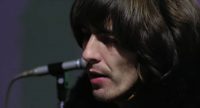
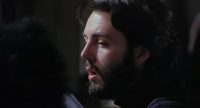
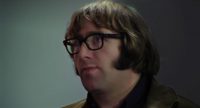
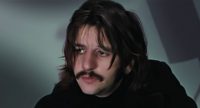

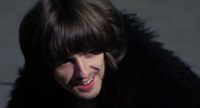

Get Your Rocks Off! is Harrison running through the chorus of a then unreleased Dylan song recorded during the Basement Tapes sessions.
It was first recorded by Coulson, Dean, McGuinness, Flint in 1972 for their album Lo and Behold! and was covered by Manfred Mann’s Earth Band on their 1973 album Messin’.
Hello everyone,
I guess ‘True Love’ is not Elvis’s (Cole Porter’s) song, but Carl Perkins’s ‘Your True Love’.
It was the Cole Porter song, but just a few bars. Michael Lindsay-Hogg mentioned it was his favourite song, and Paul sang a little bit in response.